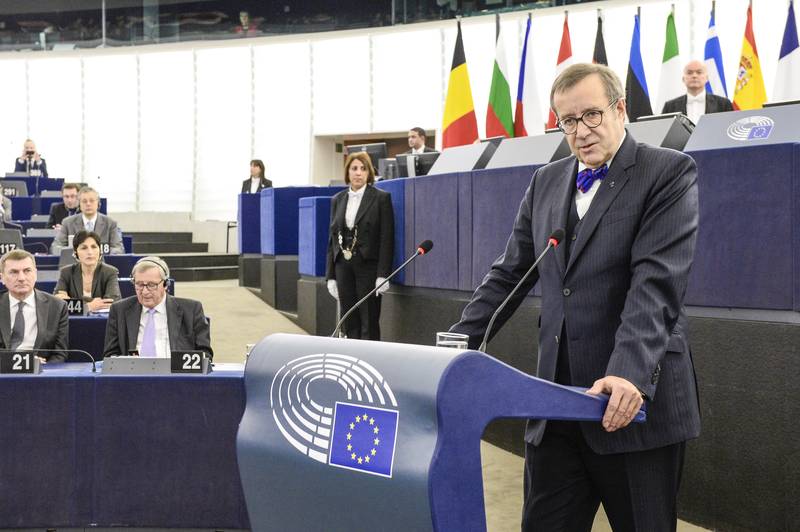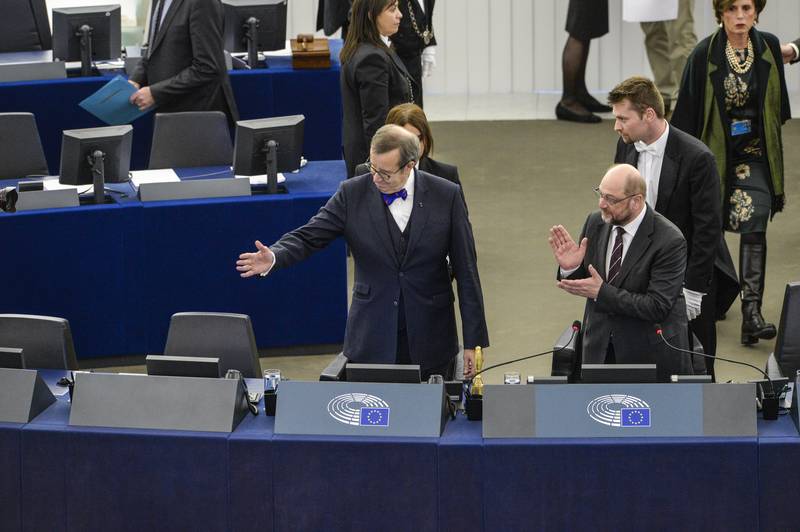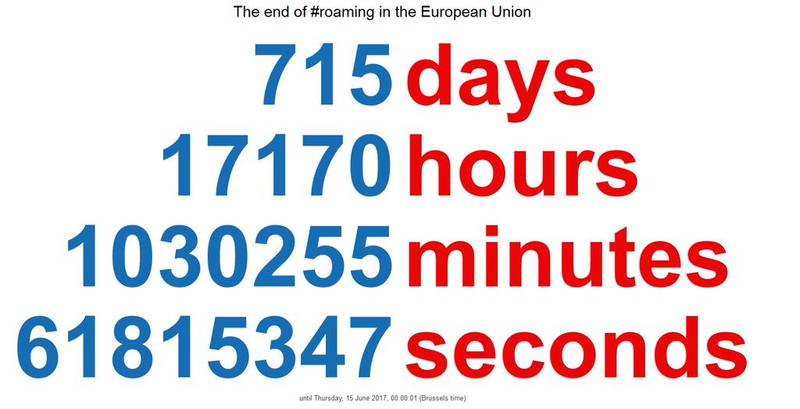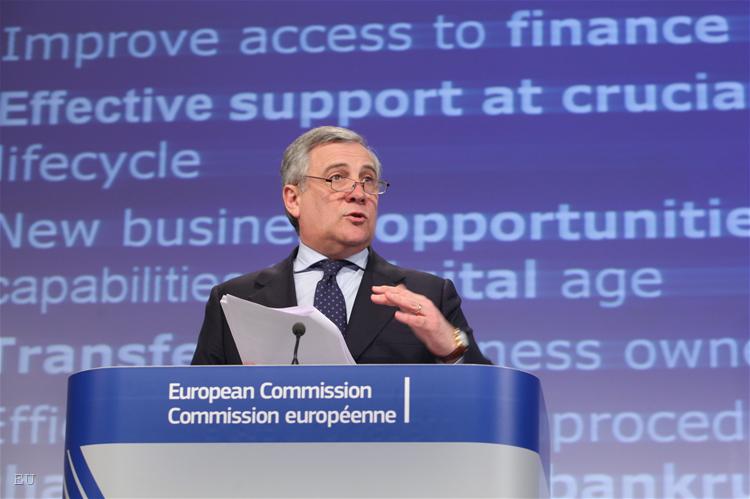E-stonian President Proposes a Fifth Freedom in EU -- Movement of Data
Adelina Marini, February 4, 2016
 Who else, but the president of E-stonia – the EU country with the most advanced e-government – could suggest such a thing? The country, where voting online has been happening for a decade now. Toomas Hendrik Ilves adds that this is not just catering to the whims of the young urban elite. Sociological studies show that there is no demographic or geographic division. “The pensioner living in a small village is just as likely to vote online, Skype with her family and stay in touch with her doctor remotely as are her grandchildren”, he said at the closing of his inspiring speech in front of the European Parliament on February 2nd. For quite some time now the EP had not given its tribune to a European leader to share their visions on the EU, excluding the joint address of German Chancellor Angela Merkel and French President François Hollande on the dangers the Union is facing.
Who else, but the president of E-stonia – the EU country with the most advanced e-government – could suggest such a thing? The country, where voting online has been happening for a decade now. Toomas Hendrik Ilves adds that this is not just catering to the whims of the young urban elite. Sociological studies show that there is no demographic or geographic division. “The pensioner living in a small village is just as likely to vote online, Skype with her family and stay in touch with her doctor remotely as are her grandchildren”, he said at the closing of his inspiring speech in front of the European Parliament on February 2nd. For quite some time now the EP had not given its tribune to a European leader to share their visions on the EU, excluding the joint address of German Chancellor Angela Merkel and French President François Hollande on the dangers the Union is facing.
Although he is the president of a small country, the message of the son of Estonian refugees, speaking in a thick American accent, was not less powerful than the one of the twin engine of the EU, France and Germany. Maybe even more so, for this was the voice of a country that has a lot to lose if the EU is to disintegrate. “For the past quarter century, in the absence of any external threats, we have pursued the reintegration of Europe – also to bring back to the fold those nations forced against their will to live under totalitarian rule”, he said in the beginning of his speech, applauded many times with standing ovations by the full hall in Strasbourg. Quoting the poem “The Second Coming” by Irish poet William Butler Yeats, written after the First World War, the Estonian president explained that Europe was in a deep existential crisis.
“Europe is amidst a transformational crisis. Do we pull together or do we let others deal with it? A transformational crisis where we shall put to the test all that Europe has achieved, step by step, since Monnet and Schuman. We are approaching a tipping point, where either we become stronger or we let fissiparous forces prevail”. A large part of this transformational crisis was predictable, he said. “We knew there were serious problems ,but we put off dealing with the internal European crisis of the euro until it was almost unmanageable. We thought, at least until recently, that was the greatest threat to the European project. We were wrong”, added Toomas Hendrik Ilves.
According to him, Europe knew very well that the large discrepancies in incomes and democratic values between Europe and her immediate surroundings were a time bomb. The son of Estonian refugees, who fled World War I to Sweden, and later to the USA, reminded that Europe had dealt with much larger numbers of refugees than there are now and admitting his parents, who have not always felt very well in Sweden, have at least gotten a chance. He expressed romantic hope that someday the president of a democratic Syria may speak Arabic with a German accent. The solution to the refugee crisis is a fair burden-sharing. “We must act in solidarity with those member states that bear the brunt of the crisis, and we must accept a functional form of burden-sharing”.
The crisis, which was not predictable, however, was the one with the annexation of the Crimea, which showed that international treaties can no longer guarantee the peace on the continent like they used to. Relations with Russia will remain strained for quite some time, he said and warned that the currently chosen way towards Russia is no policy. “Strategic patience is the keyword. Some call for dialogue, yes, but dialogue itself is not a policy, at least not a policy to counter aggression. That much we should have learned from Munich in 1938”, having in mind the Munich Agreement, which allowed Germany to annex a part of then Czechoslovakia, which was populated by Germans.
The shadow of another crisis hangs over Europe, however – it could miss taking advantage of the digital revolution, which, in his words, is in its very beginning. He told the MEPs the story of a 23 year-old youngster, who received a small amount of money for a start-up. He said, however, that he was moving to the US, because this is where the opportunities are. Six months later, he received a 4.6 million dollar investment in his company, which he sold three years later for 100 million dollars. Skype, developed in Estonia, also “lives” in the USA. “He could have stayed in Estonia if we had had a single market and the financing”, said the Estonian president about the young man, who chose the land of opportunity. Later, he said how he was unable to use his e-prescription outside of Estonia, and that today it is easier to order a bottle of olive oil from Sicily to be delivered to the north part of the Arctic Circle, then to send a song from iTune across the border.
“Technologically there is no problem; it is in our laws”, underlined Toomas Hendrik Ilves and was again given loud applause by the MEPs. He feels the EC’s proposal for the development of a single digital market lays the foundation to the free movement of data, but this should not turn into a goal, which has to be reached by a certain deadline, but into a value of the internal market. The words of the Estonian head of state fully coincide with the views of Dutch PM Mark Rutte, whose country took over the rotating presidency of the EU. During the World Economic Forum in Davos, Mr Rutte stated that there really was not too much Europe. Only 45% of the EU economy participates in the common market.
 If nothing is done, the nationalists will win, continued the Estonian president and pointed out that just a few years back today’s political speech was only seen written by anonymous authors in online fora. Today it is widespread. “Democratic, centrist leaders advocating calm and responsible policies are increasingly under pressure, if not attack”, said the Estonian president with sadness and added that because of the lack of adequate solutions people are turning more and more towards rhetoric, which sounds decisive, but is harmful. Simple and often non-European solutions are being offered, and the EU was created exactly with the goal of fighting them. He ended his speech with another quote from Yeats: “The best lack all conviction, while the worst are full of passionate intensity”, with which he raised everybody in the hall of the EP into a standing ovation.
If nothing is done, the nationalists will win, continued the Estonian president and pointed out that just a few years back today’s political speech was only seen written by anonymous authors in online fora. Today it is widespread. “Democratic, centrist leaders advocating calm and responsible policies are increasingly under pressure, if not attack”, said the Estonian president with sadness and added that because of the lack of adequate solutions people are turning more and more towards rhetoric, which sounds decisive, but is harmful. Simple and often non-European solutions are being offered, and the EU was created exactly with the goal of fighting them. He ended his speech with another quote from Yeats: “The best lack all conviction, while the worst are full of passionate intensity”, with which he raised everybody in the hall of the EP into a standing ovation.
Toomas Hendrik Ilves was born in Sweden, but grew up in the USA, where he graduated Psychology. He worked as a journalist in Radio Free Europe in Munich. After Estonia declared independence, he went to serve as ambassador to the USA. He was foreign minister of Estonia and member of the European Parliament. He was a member of the Social-Democratic party, but at the moment is politically non-attached. He is at the end of his second term as president. You can read the full speech of the Estonian president here.
Translated by Stanimir Stoev
 | © European Commission
| © European Commission | © EU
| © EU | © EU
| © EU